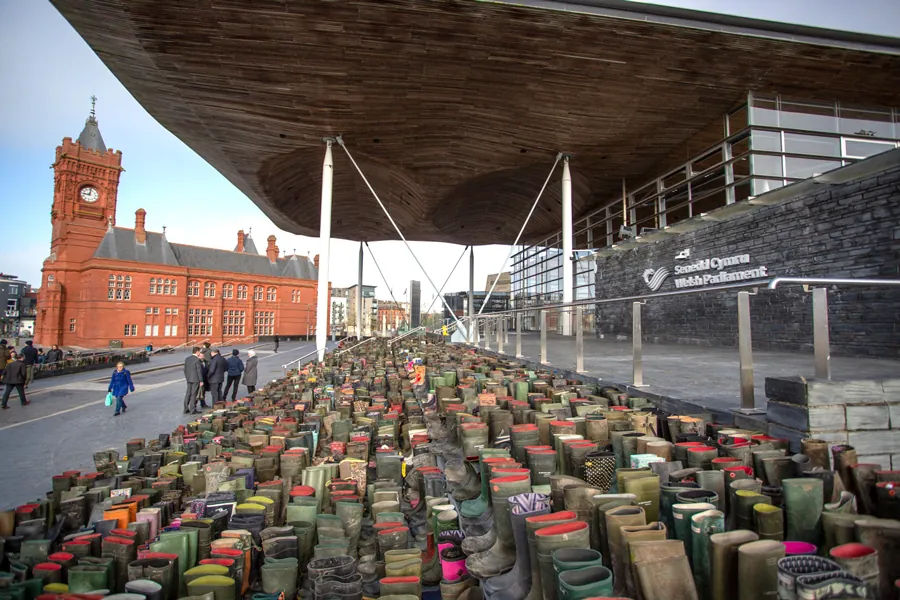Why did rural affairs minister refuse to talk about farmers’ SFS concerns?
18th March 2024
Rural affairs minister Lesley Griffiths refused to meet Welsh secretary David TC Davies to discuss farmers’ concerns in regards to the Sustainable Farming Scheme (SFS).

Welsh farmers have been protesting against the new proposal, which forces them to allocate 10% of their lands to planting trees and another 10% to wildlife habitat creation.
The most recent protest took place in Cardiff on 28th February outside the Senedd. The demonstration was called the largest protest in Welsh history.
Mr Davies recently wrote to the Labour Minister, inquiring about a meeting to discuss the situation. His request has been rejected.
‘Absolutely disgraceful’

Mr Davies wrote on his social media: “It is absolutely disgraceful that the Labour Rural Affairs Minister is refusing a meeting with an elected representative, who represents a rural constituency, to hear farmers’ growing anxiety that her government has caused.
“Farmers are horrified that 20% of their land could be taken out of production for tree planting and other schemes.
“But that isn’t stopping the Labour Welsh Government from hypocritically chopping down 850,000 tonnes of wood on land that they own every year to sell. A sensible approach going forward is for the Labour government to grow trees on their own land, rather than force farmers to give up prime agricultural land for this purpose.”
Not possible due to diary commitments
The team behind minister Griffiths said that the meeting request was made as member of Parliament rather than as secretary of state. It was not possible due to diary commitments and the minister passed on her apologies.

A Welsh Government spokesperson said: “Farming is very important both to Wales and to our economy and we want a successful future for Welsh farming. In Wales, we have maintained the Basic Payment Scheme at £238m in 2024, which was not easy in the financial circumstances. It is something farmers asked us to do in order to provide stability and we listened. This compares with cuts of up to 55% to BPS payments in England.
“The proposed scheme requirement for 10% tree cover includes existing broadleaf and coniferous woodlands, as well as individual trees scattered throughout fields and hedgerows.
“We are not proposing farmers plant an additional 10% over and above the trees they already have. Regarding the 10% habitat requirement, on the whole habitats exist because they are grazed by livestock and will continue to be grazed by livestock. Therefore, these areas are not lost to food production.
“The Welsh Government Woodland Estate is managed by Natural Resources Wales in accordance with the key objective of Sustainable Management of Natural Resources. The timber harvesting cycle includes a restocking programme to provide a sustainable source of harvestable timber for the future.”
Significant challenges
At the end of February, first minister Mark Drakeford and Ms Griffiths issued a joint written statement that reads: “Farming – and agriculture more widely – plays an important role in Welsh life. It is part of our economy, identity and culture.
“The Welsh Government is committed to supporting a successful future for Welsh farming. We want to keep Welsh farmers farming, as we tackle the climate and nature emergency.
“The sector is facing significant challenges as a result of persistently high inflation and energy costs, global instability, high input costs and volatile farmgate prices together with substantial change in the industry.
“We continue to listen carefully to the concerns expressed by farmers and farming unions, including about some of the Welsh Government’s policies.”
Working in partnership
The statement continued that the ministers have been working in partnership with farmers over the last seven years to design the SFS, a new form of made-in-Wales farming support to secure food production and the environmental improvements Wales needs to keep farmers on their land for generations to come as the climate changes.
It continues: “The SFS will help us to meet the commitments we have made to everyone in Wales, securing a stronger and greener future for us all and ensuring public benefits from sustainable farming in return for public money.
“We welcome the responses to the consultation. Every consultation response received, including the issues raised and discussed at the 10 roadshow events during the consultation period, will be analysed and properly considered. We will publish that analysis and a summary of the responses.”
Next steps
On the basis of the views expressed to date, the ministers set out some potential next steps:
- Ensuring that where farmers are asked to gather information as part of SFS, this process will be as efficient as possible, GDPR compliant and maximise the value of that data to farmers
- Ensuring actions within SFS are appropriately targeted at improving the economic resilience of farms. This includes ensuring woodland and habitat requirements do not make farms unviable
- Ensuring farm payments are distributed fairly and accessible to all
- Considering an evidence-based review of any further and alternative proposals to achieve carbon sequestration within the Sustainable Farming Scheme
- Establish regular review points between the Welsh Government and the farming unions and representatives, in formulating final proposals
- Carry out an updated economic analysis.
Wellies lined up to represent jobs lost
The display was put together by farmers at the Senedd in Cardiff Bay on Wednesday 6th March, the eve of the closing of Welsh Government’s ‘Keeping Farmers Farming’ Sustainable Farming Scheme consultation.

Each of the 5,500 wellingtons outside the Senedd building represents an agricultural job that is projected to be lost based on 100% take up of the scheme – as based on figures from Welsh Government’s own impact assessment.
Farmers across the country donated 5,500 pairs of wellingtons, that will next be donated to African charities.

